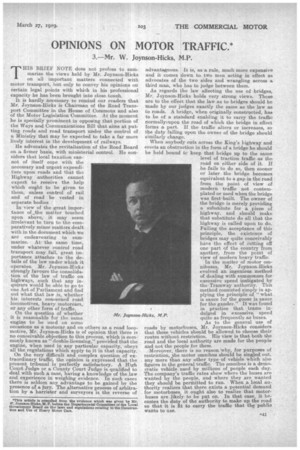OPINIONS ON MOTOR TRAFFIC.*
Page 15

If you've noticed an error in this article please click here to report it so we can fix it.
3.—Mr. W. Joynson-Hicks, M.P.
THIS BRIEF NOTE does not profess to summarize the views held by Mr. Joynson-Hicks on all important matters connected with motor transport, but only to convey his opinions on certain legal points with which in his professional capacity he has been brought into close touch.
It is hardly necessary to remind our readers that Mr. Joyn,son-Hicks is Chairman of the Road Transport Committee in the House of Commons and also of the Motor Legislation Committee. At the moment he is specially prominent in opposing that portion of the Ways and Communications Bill that aims at putting roads and road transport under the control of a Ministry that may be expected to take a far more lively interest in the development of railways.
He advocates the revitalization of the Road Board on a firmer basis, with ministerial control. He considers that local taxation cannot of itself cope with the necessary and urgent expenditure upon roads and that the Highway authorities cannot expect to receive the help which ought to be given to them, unless control of rail and of road be vested in separate bodies In view of the great importance of _the matter touched upon above, it may seem irrelevant to turn to the comparatively minor matters dealt with in the document which we are endeavouring to summarize. At the same time, under whatever control road transport may fall, great importance attaches to the details of the law under which it operates. Mr. Joynson-Hicka strongly favours the consolidation of the law of traffic on highways, such that any inquirers would be able to go to ane Act of Parliament and find out what that law is, whether his interests concerned road locomotives, heavy motorcars, or any other form of traffic.
On the question of whether it is reasonable for the same engine to be used on some occasions as a motocar and on others as a road locomotive, Mr. Joynson-Hicks is of opinion that there is no conceivable objection to this process, which is commonly known as "double-licensing," provided that the engine, when used in any particular capacity, obeys all the regulations which apply to it in that capacity. On the very difficult and complex question of extraordinary traffic, the opinion is expressed that the present tribunal is perfectly satisfactory. A High Court Judge or a County Court Judge is qualified to deal with such a, case, having a knowledge of the law and experience in weighing evidence. In such cases there is seldom any advantage to be gained by the presence of a jury. The alternative process of arbitration by a barrister and surveyors is the reverse of advantageous. It is, as a rule, much more expensive and it comes down to two men acting in effect as advocates of the two sides and wrangling across a third man, who has to judge between them.
As regards the law affecting the use of bridges, Mr. Joynson-Hicks holds very strong views. These are to the effect that the law as to bridges should be made by our judges exactly the same as the law as to roads. A bridge, when originally constructed, has to be of a standard enabling it to carry the traffic normallyiupon the road of which the bridge in effect forms a part. If the traffic alters or increases, so the duty falling upon the owner of the bridge should similarly change.
When anybody cuts across the King's highway and erects an obstruction in the form of a bridge he should be held bound to keep that bridge up to the same level of traction traffic as the road on either side of it. If he fails to do so, then sooner or later the bridge becomes equivalent to a gap in the road from the point of view of modern traffic not contemplated or used when the bridge was first.built. The owner of the bridge is merely providing a substitute for a piece of highway, and should make that substitute do all that the highway is called upon to do. Failing the acceptance of this principle, the existence of bridges may quite conceivably have the effect of cutting off one part of the country from another, from the point of view of modern heavy traffic. In the matter of motor omnibuses, Mr. Jeynson-Hicks evolved an ingenious method of dealing with summonses for excessive speed instigated by the ,Tramway authority. This method consisted simply in applying the principle of what is sauce for the goose is sauce for the gander." It was found in practice that trams indulged in excessive speed quite as frequently as buses.
As to the general use of roads by motorbuses, Mr. Joynson-Hicks considers that these vehicles should be allowed to choose their routes without restriction. His view is that both the road and the local authority are made for the people and not the people for them. Moreover, there is no reason 'why, for purposes of restriction, the motor omnibus should be singled out, any more than any other type of vehicle which also figures in the general traffic. The omnibus is a democratic vehicle used by millions of people each day. The company's traffic rates show where the buses are wanted by the people, and where they are wanted they should be permitted to run. When. a local authority realizes that there exists a potential demand for raotorbuses, it ought also to realize that motorbuses are likely to be put on. In that case, it becomes the the duty of the authority to make up the road so that it is fit to carry the traffic that the public wants to use.






















